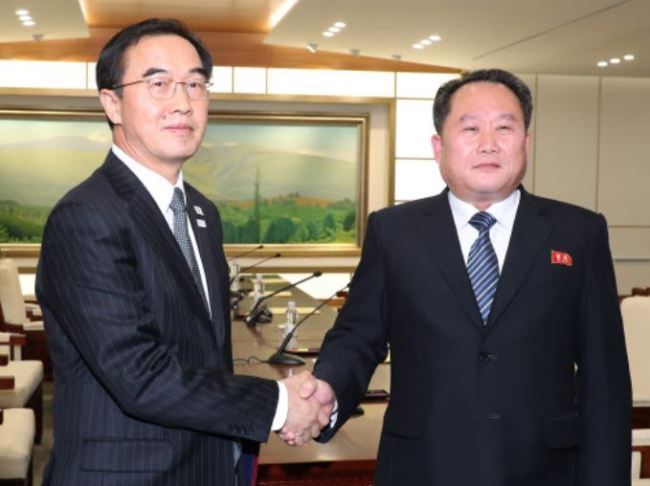Two Koreas set for military talks, but challenges remain
By Yeo Jun-sukPublished : Jan. 10, 2018 - 16:19
With the two Koreas gearing up for military talks to ease tensions, the focus is now on how much progress they will be able to make, as the US continues to raise concerns over North Korea’s motive behind its diplomatic overture.
In a joint statement released Tuesday, the two Koreas agreed to hold military talks and additional high-level meetings, with Pyongyang agreeing to send its delegates and athletes to the 2018 PyeongChang Winter Olympics.
Prospects of the military talks, however, remain to be seen as the two Koreas could be at odds over sensitive issues, in particular North Korea’s demand for South Korea to suspend its annual military exercises with the US, which the allies would most likely reject.
“We have to start from easy issues and procced gradually,” a senior South Korean defense official told reporters under the condition of anonymity. “Since there have been few exchanges between the two Koreas, there are many minor issues to be dealt with.”
In a joint statement released Tuesday, the two Koreas agreed to hold military talks and additional high-level meetings, with Pyongyang agreeing to send its delegates and athletes to the 2018 PyeongChang Winter Olympics.
Prospects of the military talks, however, remain to be seen as the two Koreas could be at odds over sensitive issues, in particular North Korea’s demand for South Korea to suspend its annual military exercises with the US, which the allies would most likely reject.
“We have to start from easy issues and procced gradually,” a senior South Korean defense official told reporters under the condition of anonymity. “Since there have been few exchanges between the two Koreas, there are many minor issues to be dealt with.”

For now, the military talks would focus on finding a way to ease cross-border tensions before the opening of the Olympics, the official said, ensuring the safety of North Korea’s delegates when they cross the border through the heavily fortified Demilitarized Zone.
But the official kept open the possibility that the talks would be developed into a discussion of more serious issues, such as the two Koreas’ cross-border propaganda broadcasts, and possibly, upcoming South Korea-US joint military exercises.
Gen. Vincent K. Brooks, the commander of US Forces Korea, said the inter-Korean dialogue should be limited to the Olympics Games, warning of the possibility that North Korea would manipulate the dialogue to promote its own agenda.
“Take that as it is, don’t read anything more into it,” said Brooks at a forum hosted by the American Chamber of Commerce in South Korea on Wednesday. “The focus is going to be on the PyeongChang Olympics and finding a way to have both Koreas participate as representatives.”
“We have seen occasions where North Korea, instead of coming to meetings with productive sense, they come into it with disrupted sense, where it is more theatrical than productive. … We can’t ignore the fact it happened … make sure your expectations are at a right place.”
As an initial measure to ease military tensions, the South Korean military recommenced normal operations of a communication channel in the west coast, which was reconnected Tuesday after Pyongyang cut it off in 2016 to protest Seoul’s shutting down of a joint industrial complex in Kaesong.
The communication test lasted for five minutes from 8 a.m. without significant dialogue with North Korea, Seoul’s Defense Ministry said. Overall, the communication line worked properly, but a malfunction was found when South Korea received a signal from the North, the ministry added.
The move to ease South-North relations could be challenged if North Korea demands South Korea suspend its joint military exercises with the US, which Seoul and the US are most likely to reject.
President Moon Jae-in and his US counterpart Donald Trump agreed to postpone Korea-US military exercises until after the Olympics, but cross-border tensions could flare up again when the allies resume the annual drill.
Citing anonymous government officials, local daily Dong-A Ilbo reported the springtime exercise would start on April 1, with the allies’ militaries having “practically agreed” that the Foul Eagle exercise would kick off on April 1 and the computer-simulated Key Resolve exercise on April 23.
Another contentious point is whether the two Koreas will suspend their cross-border propaganda broadcasts, a source of tension which, in the past, prompted the two Koreas to engage in military skirmishes along the border.
North Korea has consistently demanded that South Korea do away with the loudspeakers, which blare news of the outside world and criticism of the North’s leader Kim Jong-un, as well as South Korean pop music, across the DMZ.
North Korea threatened to take down the loudspeakers in August 2015, when South Korea began the broadcasts, after its border guards were maimed by land mines, purportedly planted by the North. The two Koreas later agreed to stop the broadcasts, but South Korea resumed them in January 2016 when North Korea tested what it claimed was a hydrogen nuclear bomb
By Yeo Jun-suk (jasonyeo@heraldcorp.com)






![[KH Explains] How should Korea adjust its trade defenses against Chinese EVs?](http://res.heraldm.com/phpwas/restmb_idxmake.php?idx=644&simg=/content/image/2024/04/15/20240415050562_0.jpg&u=20240415144419)











![[Today’s K-pop] Stray Kids to return soon: report](http://res.heraldm.com/phpwas/restmb_idxmake.php?idx=642&simg=/content/image/2024/04/16/20240416050713_0.jpg&u=)